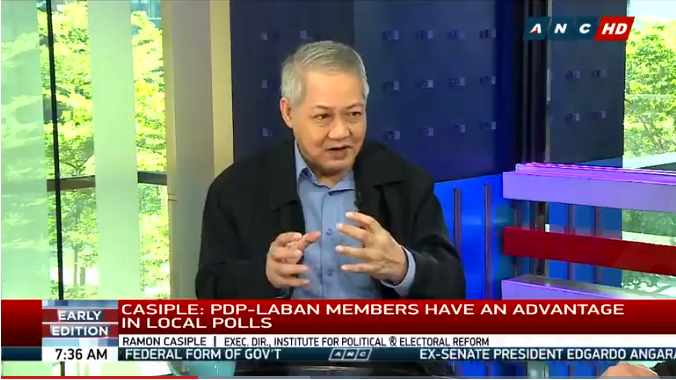Barangay Polls: Television Does the Job

Screengrab from ANC’s Early Edition.
CHEERS TO TV reports on Monday, May 14 which provided substantial information regarding the Barangay and Sangguniang Kabataan (SK) Election. Issues concerning the local government hardly draw media attention that these deserve. Postponed twice by the Duterte administration, the political significance of these issues should not be further diminished by the indifference of journalists.
The SK is a council that represents the youth in each barangay. In 2013, concerns that it was becoming a “breeding ground for political dynasty and corruption” led legislators to postpone its election and vacate all the council’s positions.
After a five-year break, this is the first election under the SK Reform Act of 2015. The reform disqualifies candidates with kin who are officials in “the second level of consanguinity in the same area.” This provision marks history as the first Philippine law with an anti-political dynasty restriction.
The Barangay and SK finally pushed through after nearly two years delay. With almost seven hundred thousand posts to be filled, there was much at stake in the recent village and youth polls.
Elections in the Philippines are embedded with the flaws of the country’s political culture, dominated by candidates despite issues of competence and integrity. ANC’s Early Edition featured Ramon Casiple, executive director of the Institute for Political and Electoral Reform, who discussed the role of barangay officials in the mid-term elections. Calling it the “first battle,” Casiple explained that holding majority of barangay seats will afford political parties an advantage in the 2019 local elections. Casiple said the need for “drastic” reforms, without which both barangay and SK elections will be plagued with old issues of patronage and corruption (“‘Drastic’ reforms pushed to shield barangay officials from partisan politics”).
Aksyon aired a three-part explainer series that featured the importance of the village polls, the funds and resources at stake and the roles of each barangay and youth official.
CNN Philippines featured an investigative report on how politics can sometimes become a “family enterprise.” Reporter Ruth Cabal looked into the practice of nepotism, patronage and political dynasties in local barangays (“Why nepotism is a form of corruption, abuse of authority”).
GMA News TV’s State of the Nation with Jessica Soho opted for a history lesson in brief, tracing the barangay from the pre-colonial to the Martial Law era, highlighting laws that legitimized the barangay council (“SONA: Salitang barangay, mula sa balangay na bangkang ginamit ng mga Pilipino noon”).
CMFR commends broadcast channels for their live coverage of the village polls on the day itself, while pointing out that media could have given more attention to the barangay politics and related issues before the vote.
As the barangay functions as a political unit in the grassroots, the choice of officials have a lot to do with the quality of public service that affects citizens on a daily basis. CMFR noted that more coverage of the functions and responsibilities of these barangay officials would have helped citizens to review the competence and integrity of candidates and to make better choices. The barangay chief and the kagawad they place in power gain a significant measure of power; these are also better paid than they had been before. While these are not full time jobs, these need to be ready to attend to the needs of their communities as these arise.
The SK on the other hand could provide for a successor generation for political leadership. But unless the public cares, this too can just perpetrate dynastic and trapo politics.
In a previous monitor, CMFR observed that news on the postponement of barangay elections showed very little journalistic interest and suggested an unsettling indifference to the importance of the barangay (See: “Delayed Reaction to the Postponement of Barangay Elections”).
Understandably, village polls will not be as heavily reported as other elections. But a little bit more regular coverage of local issues, and not just during the elections period, would go a long way to build up the capacity of citizens to evaluate officials who seek public office. This level of participation is key to making democracy work better in this country.
Manning the frontlines of every administration’s policy and programs, barangay officials deserve to be watched by the electorate who place them in power. The media plays a part in making this happen.
Leave a Reply